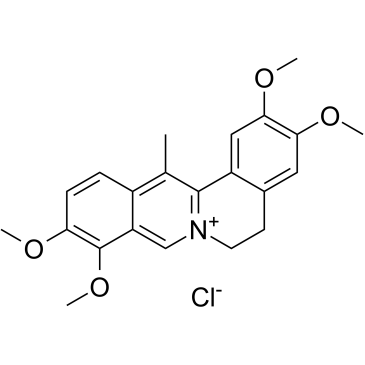Dehydrocorydaline chloride |
| Catalog No.GC35832 |
An alkaloid with diverse biological activities
Products are for research use only. Not for human use. We do not sell to patients.

Cas No.: 10605-03-5
Sample solution is provided at 25 µL, 10mM.
Dehydrocorydaline chloride is an alkaloidal that has anti-inflammatory and anti-cancer activities. Dehydrocorydaline chloride can elevate p38 MAPK activation. p38 MAPK[1]
Treatment of C2C12 myoblasts with 500 nM Dehydrocorydaline increases the expression levels of muscle-specific proteins, including MyoD, myogenin and myosin heavy chain. Treatment with Dehydrocorydaline elevates p38 MAPK activation and the interaction of MyoD with an E protein. Furthermore, defects in differentiation-induced p38 MAPK activation and myoblast differentiation induced by depletion of the promyogenic receptor protein Cdo in C2C12 myoblasts are restored by Dehydrocorydaline treatment[1]. Dehydrocorydaline significantly inhibits MCF-7 cell proliferation in a dose- dependent manner, which can be reversed by a caspase-8 inhibitor, Z-IETD-FMK. Dehydrocorydaline increases DNA fragments without affecting δψm. Western blotting assay shows that dehydrocorydaline dose-dependently increases Bax protein expression and decreases Bcl-2 protein expression. Furthermore, dehydrocorydaline induces activation of caspase-7,-8 and the cleavage of PARP without affecting caspase-9. These results show that dehydrocorydaline inhibits MCF-7 cell proliferation by inducing apoptosis mediated by regulating Bax/Bcl-2, activating caspases as well as cleaving PARP[3].
Dehydrocorydaline (3.6, 6 or 10 mg/kg, i.p.) shows a dose-dependent antinociceptive effect in the acetic acid-induced writhing test and significantly attenuates the formalin-induced pain responses in mice. In the formalin test, dehydrocorydaline decreases the expression of caspase 6 (CASP6), TNF-α, IL-1β and IL-6 proteins in the spinal cord. These findings confirm that Dehydrocorydaline has antinociceptive effects in mice[2].
[1]. Yoo M, et al. Dehydrocorydaline promotes myogenic differentiation via p38 MAPK activation. Mol Med Rep. 2016 Oct;14(4):3029-36. [2]. Yin ZY, et al. Antinociceptive effects of dehydrocorydaline in mouse models of inflammatory pain involve the opioid receptor and inflammatory cytokines. Sci Rep. 2016 Jun 7;6:27129 [3]. Xu Z, et al. Dehydrocorydaline inhibits breast cancer cells proliferation by inducing apoptosis in MCF-7 cells. Am J Chin Med. 2012;40(1):177-85.
Average Rating: 5 (Based on Reviews and 38 reference(s) in Google Scholar.)
GLPBIO products are for RESEARCH USE ONLY. Please make sure your review or question is research based.
Required fields are marked with *




















